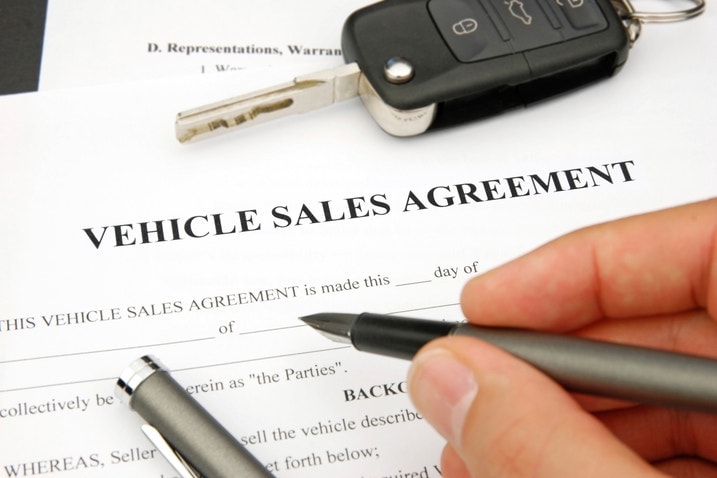Are there other car-buying fees?
Yes. Here are a few other car-buying fees that buyers should know about:
- Uncommon dealer fees: Some dealers write additional fees into the contract and give them official-sounding names, such as "S&H," "PDI," "dealer prep" or even "shipping." Find out early what extra fees you will be charged and negotiate accordingly before you sign the contract. As with doc fees, you might decide to go along with added dealer fees if you're saving money on other aspects of the deal. When in doubt about an unknown fee or term, don't hesitate to ask the dealer finance person.
- Destination fee: This is a fee that the manufacturer charges to transport a vehicle from the factory to the dealership. Getting the car to the buyer can include travel by ship, train and truck, as well as quality inspections to locate and repair any minor cosmetic issues that arise during transport. This charge is included in the car's MSRP and is typically not negotiable. The destination fee is a standard amount regardless of where you live, with the possible exception of Alaska and Hawaii, and you'll pay it even if you pick up your car at the factory.
- Market adjustment. In times of limited inventory, you're likely to find an "addendum" sticker somewhere on a new car. This is the dealership essentially saying that the vehicle in question is in short supply, and it's raising the price to make some extra profit. This can range from $1,000 to upward of $50,000 on some highly anticipated vehicles. Note that you don't have to pay this fee, but at the same time, the dealer doesn't have to sell a vehicle to you at MSRP. This fee can be negotiated down in some cases, but it will differ based on the dealership. Similarly, there are a number of dealerships that do not believe in marking up a vehicle. Ask if a vehicle has been "marked up" before visiting the dealership, and be willing to expand your search if need be. For more information, read: "Should You Pay More Than MSRP for a Car?"
- Dealer-installed options: On the same addendum sticker, you may also run into a list of accessories that the dealership added to make an extra profit. Common add-ons include anti-theft devices, nitrogen in tires, window tinting, chrome-plated wheels, all-season floor mats, splash guards, wheel locks, cargo trays and alarm systems. These aren't necessarily a "fee" per se, but they are something to be aware of that can add thousands to the price of a vehicle. Read "Negotiating a Dealer's New Car Add-Ons" for more information on how to handle these.
- Advertising fees. Sometimes buyers look up invoice prices on Edmunds and find they don't match the invoice price given by a dealer. What's going on? There might be an advertising fee attached to the invoice price of the car. The advertising fee listed on a car's invoice is an actual charge made by the manufacturer to the dealer, and you should pay it. However, some dealers will tack on an extra "unofficial" advertising fee into the sales contract, perhaps claiming they are offsetting the cost of their own advertising efforts. If you encounter this type of fee, you can challenge it or negotiate a lower purchase price on the car to offset the charge.
A final word on fees
While this chart helps estimate fees, don't expect it to allow you to calculate your final cost to the penny. Registry fees, in particular, are tricky, but DMV websites in many states have calculators to help guide you. Additionally, many states have nominal charges (less than $40) under local environmental laws. Still, this chart will tell you roughly what to expect and help you budget accordingly.
Ultimately, you'll want to pay attention to three items when purchasing a car:
1. Anything with a dollar figure and wherever you need to sign. Especially items on the sales contract.
2. The deal's overall cost. Sometimes, we get stuck on reaching a desired monthly payment and overlook other aspects of the deal, such as the interest rate and loan term.
3. The federal Truth in Lending disclosure should be present in every car deal. It outlines the most important parts of the loan, such as the interest rate, total payments and the finance charge.
Finally, doc fees and sales taxes can change from year to year. Edmunds updates this information regularly, but please let us know if you find any information that's out-of-date.
FAQs
How do you calculate sales tax on a car?
Find out what the sales tax rate is in your area by running an online search with your city and state. The sales tax on the vehicle purchase is often based on where you live rather than where you're buying the vehicle. On a calculator, input the price, plus the sales tax number, then press the "%" button to get the sales tax. And when you hit the "=" button, you'll get the total with tax included. Or you can ask the salesperson to send you the "out-the-door" price breakdown, which should include sales tax, registration and other document fees.
How much is sales tax on a car?
Sales tax can vary by city, county or state. The sales tax on the vehicle purchase is often based on where you live rather than where you're buying the vehicle. If you have a trade-in vehicle, some states will only apply sales tax on the difference between the selling price and the trade-in's value. Refer to the chart above to see which states allow this.
How much is tax and title on a car?
This amount will vary based on the vehicle and where it was purchased. The easiest way to get this information is to request an "out-the-door" price breakdown from the dealer.
How do you calculate tax on a price?
Multiply the price of the item by the decimal figure of the percent. Let's say the sales tax for your city is 9% and the car costs $30,000. In this case, you multiply 30,000 by 0.09, which gives you a total of $2,700.
Are dealer fees negotiable?
Most dealer fees, such as the documentation fee, registration and sales tax, are not negotiable — which is why your efforts are better spent negotiating the selling price of the vehicle, where the dealer is far more likely to give you a discount.
How much should I pay for dealer fees?
These fees can vary based on location and the dealership you're buying from. Ask for a detailed pricing breakdown to get an accurate figure. If there's something you don't recognize, speak up before signing any paperwork. This article should help you get a basic idea of how much the fees might be.
How much are dealer fees on a used car?
It will likely have many of the same fees as a new car. You should expect to pay for sales tax, registration, title, documentation or dealer preparation fees, and other miscellaneous state fees.
Do I have to pay dealer doc fees?
While there aren't any laws we know of that say you have to pay the doc fee, the reality is most dealerships won't budge when it comes to these fees. Sure, you can raise enough of a fuss, but your energy should instead be focused on the selling price of the vehicle, which is more flexible and likely to yield greater savings.
Footnotes:
1. Maximum sales tax: Often, you pay a combination of state, county and local taxes. This is the estimated maximum tax you should be charged, depending on where you live.
2. Average DMV fees: This data is for new vehicles only. It includes unweighted state averages and is valid as of April 23, 2025.
3. Trade-in sales tax credit? A "Y" in this column means that you will pay sales tax only on the difference between your new car purchase and the value of your trade-in. An "N" in the column signifies that you will pay tax on the full amount of your new car purchase.
4. Are incentives taxed? A "Y" in this column indicates that the buyer will pay tax on the purchase price before the manufacturer rebate is applied.
5. Doc fee limits: This will tell you if your state regulates the documentation fee and the maximum allowed amount.
6. Median doc fee: This is the typical amount you can expect to pay for a dealer documentation fee. In this case, we've provided the median amount charged per state rather than the average because we think it gives a truer representation of what most buyers will pay. The data was collected on April 23, 2025.

